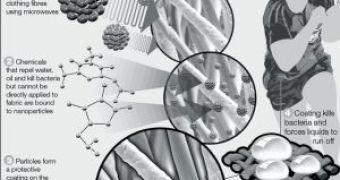Sweat smell in the locker room?
This may be already something of the past.
Scientists have produced a coating that could make filthy sport kit forgotten. The "self-cleaning" fabrics reject water, resist stains and even kill off the bacteria that develop in sweat, causing the clothes to stink. That's why the new kit could be worn repeatedly between washes, without the distinct sports aroma.
US Air Force have already developed T-shirts and underwear that can be worn hygienically for weeks at a time without washing; the technology is now to have civilian applications. It took five years to develop the technology. "We are expecting sportswear to be one of the biggest areas where this technology will be used," said John Almond, a director with Alexium, the company which will produce the new sport kits.
"We are now talking to some major sportswear brands to use this technology, but there are hundreds of other applications we are investigating, from hospital bedding and nurses' uniforms to air conditioning filters on planes and cruise ships."
"Sports kits could be in the shops within a year from an agreement being signed, and would add only "a few pounds" to the cost," said Almond.
The treated clothing needs to be washed far less often than normal fabrics and is easier to clean when finally laundered. The technology was developed initially for soldiers' uniforms, in order to confer protection in biological warfare. The fabric can kill anthrax and other bacteria used as weapons. "During Desert Storm most casualties were from bacterial infections rather than from accidents or friendly fire. We have treated T-shirts and underwear for soldiers who tested them for several weeks and found that they remained hygienic as the clothing was actively killing the bacteria. They also helped clear up some skin complaints in those testing them", said Jeff Owens, one of the scientists involved in the research.
The new technology uses microwaves to attach microscopic nanoparticles permanently to the fibers of clothing. These nanoparticles can then have a range of chemical properties attached to them to produce a surface impenetrable to water, liquids and oil and able to kill bacteria.
In time, as the active chemicals are knocked off, the material turns less effective, but the scientists claim it can be restored by soaking the material in a fresh solution of the same chemicals. "This technology could have many applications, -not just in the leisure industry. The anti-bacterial properties could be of great use for chefs in kitchens and in hospitals where antibiotic resistance is a big problem", said Ottilia Saxl, the chief executive of the leading information provider in the field, the Institute of Nanotechnology, in Stirling.

 14 DAY TRIAL //
14 DAY TRIAL //